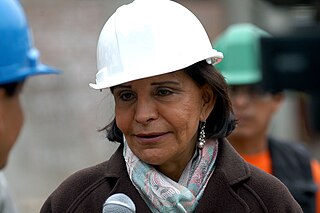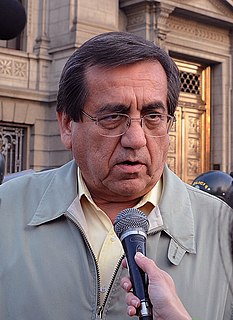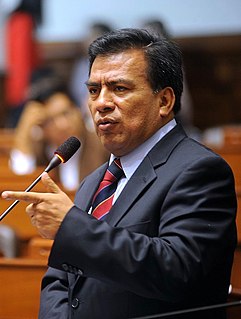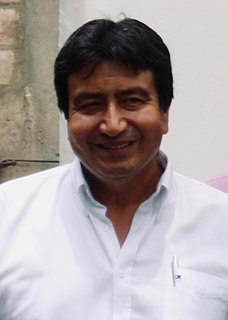
The Peruvian Aprista Party is a Peruvian political party and a member of the Socialist International. The party was founded as the American Popular Revolutionary Alliance (APRA) by Víctor Raúl Haya de la Torre, who originally intended to create a network of anti-imperialist social and political movements in Latin America. Members are called "comrades", based on the fraternity espoused by Haya de la Torre. Originally a centre-left to left-wing party with democratic socialist and nationalist elements, the party moved closer to the political centre under the leadership of Alan García starting in the 1980s, embracing social democracy and later some Third Way policies.

Víctor Raúl Haya de la Torre was a Peruvian politician, philosopher, and author who founded the American Popular Revolutionary Alliance (APRA) political movement, the oldest currently existing political party in Peru by the name of the Peruvian Aprista Party (PAP).

Luis Juan Alva Castro is a Peruvian economist and politician. In his political career, he achieved the government positions of Second Vice President of Peru, Prime Minister of Peru, President of the Congress and among other portfolios during both administrations of President Alan García.

The Christian People's Party is a center-right and conservative political party based on the principles of Christian democracy. It was founded in 1966 by a group of Peruvian Christian Democrat Party dissidents, led by Luis Bedoya Reyes.
Hayist Bases Movement was a splinter group of Peruvian Aprista Party that was founded in 1980. Led by Andrés Townsend and Francisco Diez Canseco Távara, the party claimed to be the true heirs of Víctor Raúl Haya de la Torre's ideology, as the official party swift to a more populist agenda with the leadership of Armando Villanueva, and Alan García, with the latter winning the Presidency in 1985.

General elections were held in Peru in on 9 April 2006 to elect the President, two Vice-Presidents, 120 members of Congress and five members of the Andean Parliament for the 2006–2011 period. As the no presidential candidate received a majority of the vote, a second round was held on 4 June between the top two candidates, Ollanta Humala and Alan García. Garcia won the run-off with 52.63% to Humala's 47.37%. He was subsequently inaugurated on 28 July 2006, Peruvian Independence Day.

Mercedes Cabanillas Bustamante is a Peruvian educator and politician. A prominent member of the Peruvian Aprista Party, she served as Minister of Education in the first presidency of Alan García, making her the first woman to assume a cabinet position in the history of Peru. Most recently, she briefly served as Minister of Interior in Alan García's second presidency, a position subject to scrutiny as she was signaled as responsible of the repression of natives in the 2009 Amazon crisis, in Bagua, which forced her to resign, and effectively ended her political career.

Armando Villanueva del Campo was a Peruvian politician who was the leader of the Peruvian American Popular Revolutionary Alliance. Born in Lima, his parents were Pedro Villanueva Urquijo, a gynecologist in the city, and Carmen Rosa Portal del Campo. His only legitimate sibling was his older brother Ing. Pedro Villanueva del Campo Portal.

Jorge Alfonso Alejandro Del Castillo Gálvez is a Peruvian lawyer and politician. In his career, he has served in the now abolished Peruvian Chamber of Deputies between 1990 and 1992, in the unicameral Congress of the Republic for six non-consecutive terms, between 1995 and 2011 and again from 2016 to 2019, five of which are consecutive terms, and as Mayor of Lima and the District of Barranco during the 1980s.

Luis Alberto Félix Sánchez Sánchez was a Peruvian lawyer, jurist, philosopher, historian, writer and politician. A historic member of the Peruvian Aprista Party, he became a Senator and member of two Constitutional Assemblies, in which the second one (1978–1980), he occupied the Vice-Presidency of the Assembly and the Presidency of the Constitution Committee. During the Presidency of Alan García (1985–1990), he was his Second Vice President and was appointed for a short period as Prime Minister of Peru. In Congress he served as President of the Senate two occasions. He is the oldest Vice President of Peru, taking office at the age of 84 years, 289 days.

Luis Daniel Wilson Ugarte is a Peruvian politician. He is a former Congressman, elected in the 2006 elections, representing the Cusco region for the 2006–2011 period. Wilson belongs to the Peruvian Aprista Party.

Ángel Javier Velásquez Quesquén is a Peruvian lawyer and politician. A prominent member of the Peruvian Aprista Party, he has served in Congress between 2001 and 2019, previously serving from 1995 to 2000. In Alan García's second presidency, Velásquez was sworn as the third Prime Minister of Peru of the administration, succeeding Yehude Simon in 2009. He resigned his post in 2010 with the intention to run for the Peruvian Aprista Party presidential nomination later that year. Although not selected as the nominee, he was part of the presidential ticket of Mercedes Aráoz in which he was the candidate for First Vice President until her withdrawal from the election in January 2011. In 2016, he was reelected for a fifth term in Congress, representing the Lambayeque Region under the Popular Alliance which consisted of the APRA and PPC.

Claude Maurice Mulder Bedoya, known as Mauricio Mulder, is a Peruvian politician, lawyer and former journalist. One of the most prominent and influential members of the Peruvian Aprista Party, he was Congressman from 2001 to 2019, representing Lima. From 2004 to 2010, he held the office of party Secretary General.

Javier Maximiliano Alfredo Hipólito Valle Riestra González Olaechea or simply known as Javier Valle Riestra, is a Peruvian lawyer and politician. Known member of the Peruvian Aprista Party, has held several public offices, among them the most controversial being is the President of the Council of Ministers during the presidency of Alberto Fujimori in 1998.

César Alejandro Zumaeta Flores is a Peruvian politician and a former Congressman representing Lima for the 2006–2011 term. He has been serving Congress since 1995. He was the President of the Congress of the Republic of Peru from 2010 to 2011. Zumaeta belongs to the Peruvian Aprista Party.He lost his seat in the 2011 general election when he ran for re-election, but he received only a minority of votes and has since retired from politics. He was previously a Deputy, representing the Loreto region from 1985 until 1992, when President Alberto Fujimori shut Congress down in a self-coup.

Javier Bedoya de Vivanco is a Peruvian lawyer and politician (PPC) and a former Congressman representing Lima between 2006 and 2016.
The Constituent Assembly was the tenth Constituent Assembly of Peru, convened by the government of General Francisco Morales Bermudez to facilitate the return of democracy following a decade of the self-styled Revolutionary Government of the Armed Forces. It was settled on 28 July 1978 and was led by Víctor Raúl Haya de la Torre, historical leader of the American Popular Revolutionary Alliance. Its main mission was to develop a new constitution replacing the old 1933 Constitution. This new Constitution was enacted and promulgated on 12 July 1979, and entered into force on 28 July 1980, on the opening of the constitutional government of the architect Fernando Belaúnde Terry. It was replaced 14 years later by the 1993 Constitution.
This is a list of the composition of the Congress of the Republic of Peru since the adoption of the current Constitution of Peru in 1993 starting with the 1995 elections.

Carlos Roca Cáceres is a Peruvian politician. A prominent member of the Peruvian Aprista Party, he was signaled in his youth as one of Víctor Raúl Haya de la Torre's main disciples, alongside future President of Peru, Alan García. In his political career, he served in the Constituent Assembly of 1978–1979, which drafted the Constitution of 1979, in the now-abolished Chamber of Deputies, and finally as Peruvian Ambassador to Italy, appointed in Alan García's second presidency.

Carlos Gerardo Arana Vivar is a Peruvian engineer, public administrator and politician. A ranking member of the Peruvian Aprista Party, he served in a variety of technical positions in the second presidency of Alan García, most notably as Director of the National Fund for Social Development Cooperation, from 2008 to 2011.

















